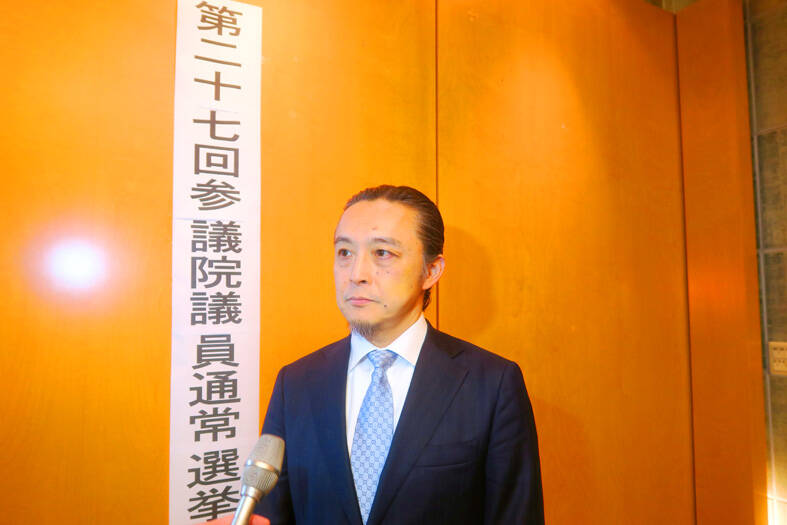Japanese nationals living in Taiwan were able to cast early votes in Japan’s House of Councilors election at a polling station in Taipei yesterday, the first time they have ever been able to cast a vote in a Japanese election in person in Taiwan.
The Japan-Taiwan Exchange Association is hosting early voting at its Taipei office — Japan’s de facto embassy in Taiwan — and at a branch office in Kaohsiung through July 14, with the full election scheduled to take place in Japan on July 20.
Previously, Japanese nationals in Taiwan could only vote by applying for ballots in advance and sending them by mail to Japan, or by traveling to Japan to cast their ballots in person.

Photo:CNA
Voting is a fundamental right for Japanese overseas, said Yo Takaba, a deputy Japanese representative to Taiwan, adding that setting up polling stations locally was a meaningful way of expanding access to democratic participation.
The association said that there had long been calls to set up overseas polling stations in Taiwan and that the decision was made following consultations with the Japanese Ministry of Foreign Affairs.
There are about 16,000 eligible Japanese voters living in Taiwan, the association said.
To be able to participate, eligible voters aged 18 or older must first register with the Japanese government to vote from abroad. Once registered, they are given a voter card that they have to show along with a photo ID at the polling stations in Taiwan to vote.
Masayuki Yamamoto, who has been working in Taiwan for two years, said he cast his vote outside of Japan for the first time yesterday, with the hope that Japan would become a better country.
Yamamoto described the process as more convenient than the traditional mail-in method and in-person voting in Japan, even though additional paperwork was required to prevent identity fraud.
Unlike Taiwan’s use of stamps to indicate a vote, Japan uses handwritten ballots, where voters write the names of their preferred candidates and political parties, and hand their ballots in sealed envelopes to polling staff.

The Coast Guard Administration (CGA) yesterday said it had deployed patrol vessels to expel a China Coast Guard ship and a Chinese fishing boat near Pratas Island (Dongsha Island, 東沙群島) in the South China Sea. The China Coast Guard vessel was 28 nautical miles (52km) northeast of Pratas at 6:15am on Thursday, approaching the island’s restricted waters, which extend 24 nautical miles from its shoreline, the CGA’s Dongsha-Nansha Branch said in a statement. The Tainan, a 2,000-tonne cutter, was deployed by the CGA to shadow the Chinese ship, which left the area at 2:39pm on Friday, the statement said. At 6:31pm on Friday,

The Chinese People’s Liberation Army Navy’s (PLAN) third aircraft carrier, the Fujian, would pose a steep challenge to Taiwan’s ability to defend itself against a full-scale invasion, a defense expert said yesterday. Institute of National Defense and Security Research analyst Chieh Chung (揭仲) made the comment hours after the PLAN confirmed the carrier recently passed through the Taiwan Strait to conduct “scientific research tests and training missions” in the South China Sea. China has two carriers in operation — the Liaoning and the Shandong — with the Fujian undergoing sea trials. Although the PLAN needs time to train the Fujian’s air wing and

Taiwanese celebrities Hank Chen (陳漢典) and Lulu Huang (黃路梓茵) announced yesterday that they are planning to marry. Huang announced and posted photos of their engagement to her social media pages yesterday morning, joking that the pair were not just doing marketing for a new show, but “really getting married.” “We’ve decided to spend all of our future happy and hilarious moments together,” she wrote. The announcement, which was later confirmed by the talent agency they share, appeared to come as a surprise even to those around them, with veteran TV host Jacky Wu (吳宗憲) saying he was “totally taken aback” by the news. Huang,

The American Institute in Taiwan (AIT) put Taiwan in danger, Ma Ying-jeou Foundation director Hsiao Hsu-tsen (蕭旭岑) said yesterday, hours after the de facto US embassy said that Beijing had misinterpreted World War II-era documents to isolate Taiwan. The AIT’s comments harmed the Republic of China’s (ROC) national interests and contradicted a part of the “six assurances” stipulating that the US would not change its official position on Taiwan’s sovereignty, Hsiao said. The “six assurances,” which were given by then-US president Ronald Reagan to Taiwan in 1982, say that Washington would not set a date for ending arm sales to Taiwan, consult